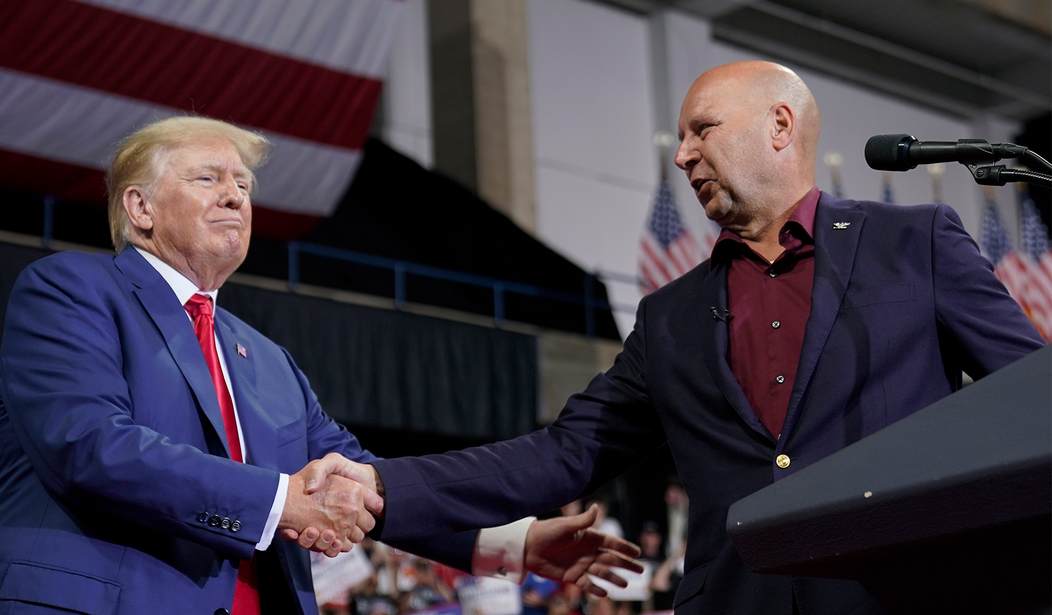Republicans blew a favorable Senate map in 2022, losing one net seat, and leaving multiple winnable contests just out of grasp. It may not have been a reasonable expectation for the party to win Arizona and Georgia, and Nevada, and Pennsylvania -- though sweeping those four races shouldn't have been out of the question, given the national climate. All they had to do was win half of those, and they'd be in the majority right now. They lost them all, and ended up not being competitive in New Hampshire or Washington, which a wave year may have put seriously in play. Despite these stark shortcomings, the reasons behind which we've previously analyzed, the 2024 Senate map is even more slanted in Republicans' direction. They should be able to win back the Senate next year, with a few seats to spare. But will they?
Joe Manchin may be in real trouble in West Virginia, especially if the GOP's top recruit is his challenger. That would hypothetically be the 50th seat -- though Manchin is a survivor, and shouldn't be written off. Elsewhere, Republicans have golden opportunities in the purple-to-red states of Montana, Ohio and Pennsylvania. Nevada and Wisconsin could be in the mix, too. But some Republicans are worried that a repeat of the 2022 dynamic, in which the party fields un-electable or less-electable nominees, could turn into another debacle -- or at least minimize gains. Josh Kraushaar at Axios describes the deja vu-style anxieties among some part strategists and leaders:
NEW Sunday Sneak @axios: “Senate Republicans have been gifted a historically favorable map for 2024, but they are again facing the risk of problematic candidates emerging in must-win races.” https://t.co/iU3xciJdNb
— Josh Kraushaar (@JoshKraushaar) March 12, 2023
In Pennsylvania, far-right 2022 gubernatorial nominee Doug Mastriano is exploring a possible run for Senate against Sen. Bob Casey (D-Pa.). Daines encouraged former hedge fund executive David McCormick to run at last month's NRSC retreat and later publicly slammed Mastriano as unelectable: "We need somebody who can win a primary and a general election. His last race demonstrated he can’t win a general," Daines told HuffPost. In Arizona, Kari Lake is seriously considering a Senate campaign against Sen. Kyrsten Sinema (I-Ariz.) and Democrat Ruben Gallego after losing her 2022 governor's race. Lake was the featured dinner speaker at CPAC, where she was enthusiastically greeted (and won the VP straw poll). She continues to deny that she lost her election and that Trump lost in 2020.
Lake seems fully committed to her Stacy Abrams impersonation bit, pretending she's the rightful governor of a state she lost (to an absolutely awful Democratic candidate, by the way), even as the top 2022 vote-getter in Arizona was a Republican, and among the same electorate that handed the GOP all three competitive House seats. Worse, Pennsylvania's Doug Mastriano got obliterated in last year's gubernatorial race, but according to at least one Democratic poll, he's the frontrunner for the Senate nomination:
Earlier today, we got a new poll showing Mastriano as the clear leader in both a 2-way primary with David McCormick, and a 3-way primary w/Kathy Barnette. Keep in mind:
— Logan Phillips (@LoganR2WH) March 13, 2023
- This is from a Dem Pollster (who may want Mastriano to run)
- There's a ton of time for the race to change pic.twitter.com/X36ZfXnCk0
It's hard to overstate the level of glee this survey result garnered among Democrats' political professionals, who would welcome another slam-dunk statewide victory in Pennsylvania victory, where Republicans were decimated last year. Are GOP voters really going to line up behind a string of proven losers, given the last round's results? Democrats are rooting hard for that outcome. Across the country, Democrats made crystal clear which Republicans they hoped to face in the general election, and in every single race in which they meddled (then went on to face their preferred opponent), they won. I've said it before, and I'll say it again: Perhaps GOP voters should take note of Democrats' favored Republican candidates, then decline to give the opposition precisely what they want.

























